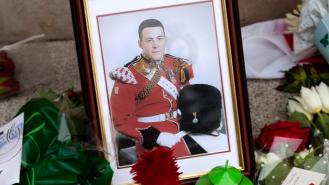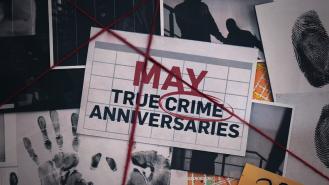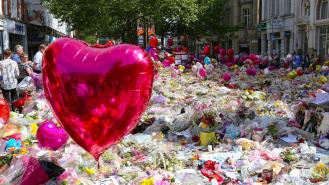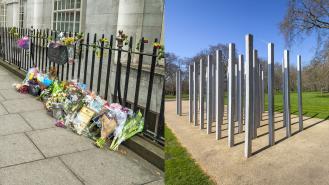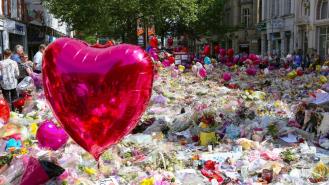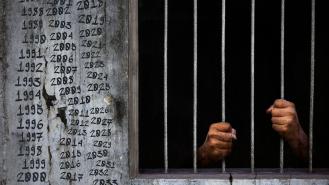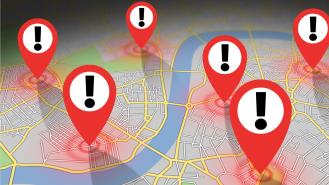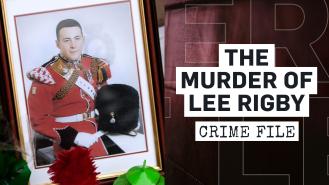
On 22 May 2013, 25-year-old soldier Lee Rigby was murdered by Islamic extremists near the Royal Artillery Barracks in Woolwich, southeast London. Rigby was walking back to his base when he was attacked and killed by Michael Adebolajo and Michael Adebowale. The pair ran down the soldier with their car and attacked him with knives. Rigby was targeted to avenge the killing of Muslims by the British military.
This brutal act of terror against a serving British soldier on home soil shocked the nation and led to a moment of national reflection. The horror of the crime was captured in video footage, broadcast across news programmes that evening in which Michael Adebolajo with bloodied hands, addressed the camera and justified the killing.
The Aftermath
“It was the barbaric reality of terrorism on our land...it’s left an indelible print on society”Dr Abdul Haqq Baker – former chairman of Brixton mosque and founder of STREET UK.
Intelligence agencies are aware that there is little they can do to combat this new form of terrorism. The killers received no training and indeed had no contact with organisations like al-Qaeda and yet they were able to make a huge media impact:“This was an incredibly successful attack...obviously there are far more lethal attacks out there. But it got a huge amount of media coverage.” Professor Andrew Silke – Programme Director for Terrorism studies, University of East London.
But as successful as it was in capturing the headlines, the killers ultimately failed to achieve anything tangible. Community relations were strengthened not divided by the killing. Admittedly, there were some low-level outbreaks of violence by right-wing groups targeting Muslims and mosques. But the general view was that these were as senseless and pointless as the killing of Lee Rigby. Not surprisingly, foreign policy stayed exactly the same and, if anything, support, or at least empathy, for the troops increased. And of course, the murderers failed to martyr themselves, or persuade anyone that they themselves were soldiers.
But for the family of Lee Rigby, and the witnesses who saw his last shocking moments, life has forever changed. As much as Tina Nimmo has tried to move on from that day, the scene she witnessed still seeps into her mind and still haunt hers. And where once she was happy to see uniformed soldiers on her streets, now she is fearful:“(Woolwich barracks) been a garrison for many years and...we’ve...got so much in pride in the borough in our armed forces...We see the soldiers walking about...all their gear on. And they’ve never been bothered and you actually feel quite proud. But not anymore: It doesn’t feel like that. If I see a soldier with his gear on, I think ‘go and take it off because you’re going to be identified.”Lee’s son Jack was just two when his father was taken from him.
In July 2013, he attended the funeral wearing a T-shirt that said, ‘My Daddy, My Hero’. Thousands lined the streets to pay their respects:“Heaven has gained a hero”. Writing on the wreath laid in respect of Lee Rigby. In July 2014, Adebolajo, lost the first stage of his appeal. By this stage, some estimate that the pair have received over £200,000 in legal aid.
The Trial
Six months after the killing of Lee Rigby, proceedings began in November 2013 at the Old Bailey in London. Eye witness Tina Nimmo and her daughter dreaded what they, and many others, saw as an unnecessary trial; not least for the pain it would cause the Rigby family: “...That was very hard...to think that we’d both have to go to court and relive our experience with his mum and dad there...we didn’t want to put them through that. It felt like we were inflicting that pain on them. But actually, the police told us that they’re already informed of what happened so that sort of takes the burden off you a bit. You’re okay to say how it was.”
The two accused sat quietly. Adebowale was judged fit to stand trial but he had severe mental health episodes. Adebolajo who wanted to be known as Mujaahid Abu Hamza. Mujaahid Abu Hamza had lost two front teeth in a confrontation with prison officers. He may have lost his chance to be a martyr, but the trial did afford him the opportunity to repeat the message that he and his accomplice were ‘soldiers of Allah’. Their defence was simple. Yes, they killed. But they were soldiers. They killed a soldier. This was war. But this was never a military court-martial. A jury of twelve civilians – eight women and four men – would decide their fate. And outside the court room, there was virtually no support from other Muslims: “This is not representative of Islam in any shape or form, the vast majority of Muslims do not subscribe to the extremist rhetoric and distorted warped understanding of these murderers...the vast majority of Muslims in this society are proud to be Muslim, British, and participating in this particular society.” Dr Abdul Haqq Baker – former chairman of Brixton mosque and founder of STREET UK.
Adebowale’s lawyers offered no evidence in his defence other than to say he agreed with Adebolajo. The court listened to over three weeks of harrowing evidence detailing exactly what had happened on that May afternoon in Woolwich. On the 19 December the jury returned a unanimous verdict: Guilty. Both the two guilty men remained calm during the verdicts. But when, two months later, it came to the sentencing, their reaction was markedly different. BUTCHERED Mr Justice Sweeney said the pair had ‘butchered’ Lee Rigby. After, he said that instead of being ‘soldiers for Allah’, they had betrayed Islam, both men started shouting and struggling. Security guards carried the convicted men out of the dock. Adebolajo had received a whole life term. He will die in jail. Adebowale got a 45 year minimum sentence. He would be nearly 70 before he would even be considered for release.
The Prime Minister (David Cameron) publicly stated the whole country welcomed the prison terms given. And Tina Nimmo agreed: “They should never be out again, never ever. I understand people that say ‘people can change.’ ...Whatever...They’ve done what they’ve done, they’ve told us what they’ve done, they’ve put their hands up to it. Their times up. That’s the end of that. He hasn’t got a life and nor should they have.” The Rigby family also said they welcomed the sentences. And then they showed, very simply, how utterly the killers had failed. “...usually the family of a murder victim are taken away in cars (but the Rigby family) walked out of the Old Bailey. A group of them...just walked down the street...turned right, walked along that street, then turned left down to...the river. It’s almost like, now these two have been convicted and (are) behind bars, we want to show we’re not afraid to walk the streets of our capital...we’re not going to be intimidated by this. You know, we are going to walk our streets in broad daylight and feel safe.” Vikram Dodd - Crime Reporter, The Guardian
The Investigation
“They genuinely see themselves as soldiers fighting a war. They do not see themselves as criminals and they do not see themselves as psychopaths. They see themselves as soldiers fighting a war...between good and evil. This is a genuine belief. I’ve interviewed many jihadi terrorists and at the time that their engaged in violence they genuinely believe they are doing the right thing...” Professor Andrew Silke – Programme Director for Terrorism studies, University of East London.
By the middle of June 2013, both Adebowale and Adebolajo were released from hospital and charged with Lee Rigby’s murder. Their police interviews would reveal the true evil behind their actions. Adebelajo sat with a blue blanket. At one point he said, ‘the soldier is the most fair target’. He added: “When he crossed the road in front of me, it was almost as if I was not in control of myself. I accelerated, I hit him...We wished to fulfil our promise to Allah, we did not wish to give him much pain. I could see he was still alive...I’m not sure how I struck the first blow. The most humane way to kill any creature is to cut the jugular. May be my enemy but he is a man, so I struck at the neck and attempted to remove the head.”
In the Lee Rigby case, the investigation wasn’t to find who the killers were. It was to ascertain if the two killers were mentally fit to stand trial. “Adebowale had mental health problems...he had effects from that attack he witnessed from the age of 16. He still heard the voice of his attacker. He had also problems associated with the use of skunk...He heard sometimes voices...he talked about in his assessments about hearing spirits called ‘Jinns’. So he had pretty clear mental health problems but was still responsible for his actions. Adebolajo on the other hand, the more dominant...of the two, is assessed to be absolutely sane.” Vikram Dodd - Crime Reporter, The Guardian Detectives interviewed him. After weeks of assessment, a trial date was set.
The Arrest
In the dazed moments after the butchering of Lee Rigby, one of the women asked the two killers if they were going to harm anyone else. Adebolajo replied; “No. The women and children are safe. You need to keep back when the police and the soldiers get here’
Unarmed police arrived at 14:29. It will be another five minutes before armed response arrives. “They ...know that the police are not going to intervene immediately because they’re going to have to wait for armed officers. That means...10-15 minutes...waiting for armed officers. In truth they could have attacked members of the public during this time. They could have just gone after anyone who was there but they don’t do that...you have them talking to people allowing themselves to be filmed, knowing that this was going to be posted online in the aftermath. Even if some of the main stream news sources didn’t want to publish it, it was still going to get out there.” Professor Andrew Silke – Programme Director for Terrorism studies, University of East London.
Adebolajo and Adebowale had made their barbarically simple point. They didn’t need to kill anymore. Now, it was them who wanted to die. “...they wanted the armed police to shoot them dead. So they would become martyrs.” Vikram Dodd - Crime Reporter, The Guardian.
At 14:34 the police shot the two men. Both Adebolajo and Adebowale went down. But the police had merely made sure they were wounded and incapacitated. Adebolajo had been shot through his bicep. The two killers would not be made martyrs. The same officers who shot them, now administer first-aid. And both men were then sped to hospital.
At 2am the next morning, Lee’s mother’s worst fears are confirmed. It was then she was informed of her son’s murder. Even the press realise the extraordinarily shocking and sudden nature of the killing. They agree to withdraw from the family’s immediate area and wait for a formal statement.
The Crimes
On 22 May 2013, at 14:18 Lee Rigby crossed the road in Artillery Place. Adebolajo accelerated his car to between 30-40mph. He crashed the car into Lee. Adebolajo and Adebowale exited the car armed with a meat cleaver, knives and an unloaded antique revolver. On a London street, in broad daylight, they attacked Lee’s motionless body.
At 14:21, they drag Lee’s mortally wounded body into the middle of the road. Tina Nimmo and her daughter were driving through South East London when they were stopped by the extraordinary street scene. Her daughter saw one of the men holding a gun, a body on the ground, and made the obvious conclusion; “Michelle ...said, ‘Mum, he shot him’. And I looked and could see them, the two men and a smashed up car and the body in front. And they were holding weapons and particularly a gun and I thought well that makes sense they probably have. I got out the car and said ‘Has anybody called the police?’ and they said ‘No’. I said ‘Call the police!’ and then I went over to them.”
I was just sitting next to the window and I noticed there was a body on the ground, and there was a black guy pacing, a crashed car in a pole...
Ingrid Loyau-Kennett was travelling on the No 53 bus through Woolwich on her way home. Through the window she saw what she thought was a traffic accident: “I was just sitting next to the window and I noticed there was a body on the ground, and there was a black guy pacing, a crashed car in a pole, a Caribbean lady stroking the back of the victim. And I thought OK, although the car was a bit too straight on the pavement, I thought road accident, nervous driver thinking ‘oh my god what have I done’; a lovely lady comforting somebody, waiting for the ambulance, so he’s not dead and I’m thinking ‘ok I’ve done some first-aid’ and I knew his position was wrong so I went out of the bus and approached the victim...he didn’t look really hurt, I mean it was really strange there was no blood, there was no broken limbs. And I take his pulse and I couldn’t feel any and the lady said ‘He’s dead.’
News of the incident rapidly spread: “...just around about 2 to 2.30 there started to come through some fairly incoherent news about something happening in South East London. It was that odd, modern mix of tweets, social media, some sparse detail from the authorities...And the tweets seemed frankly unbelievable. Talk about very violent scenes of somebody being decapitated, shots being fired...it was a very...muddled picture at the start.”
This was a slaughter. It wasn’t just a stabbing...it was a slaughter...he didn’t stand a chance.
Vikram Dodd - Crime Reporter, The Guardian
At the scene, Tina Nimmo had bravely approached the two men who were holding bloody knives. “I was shouting at them and they were just continuing to hack at him...and kick him in victory. That’s what they looked like. So elated at what they had done. He was their prize. It was just awful, just awful...Them chopping him up.”
Ingrid Loyau-Kennett rapidly realised she wasn’t dealing with a traffic accident: “His head was covered with his jacket. I was going to leave the jacket and I heard a voice saying ‘Don’t touch the body.’ His hand was carrying a revolver, the other one a butcher’s knife and a meat cleaver and all covered with blood. And I thought ‘Ok. We have a situation here it’s not a car accident.’ So I thought, ‘Ok. I need to talk to him.’ And so I was standing up (to) look at him and make sure that I was not higher than him so he would dominate the situation at all times.. So I look at him and say ‘Why?’ He says, ‘Because the British army is killing civilians in Muslim countries.’ The whole situation was understandably barely comprehensible to Tina Nimmo: “I kept looking at them thinking, ‘You’re not mad...you’re not drugged up.’ They just looked calm and they just continued to do what they were doing and nobody could’ve stopped them. This was a slaughter. It wasn’t just a stabbing...it was a slaughter...he didn’t stand a chance.” And then, even more incredibly, once the two men had stopped mutilating their victim, they simply remained there. They made no attempt to flee the crime scene. “They had ample opportunity to attack other people. They didn’t. They chatted, they seemed proud of what they had done.” Vikram Dodd - Crime Reporter, The Guardian
Indeed, the attackers were so full of pride that they allowed stunned onlookers to record them on their phones: “The only reason we have killed this man today is because Muslims are dying daily by British soldiers and this British soldier is one. He is an eye for an eye and a tooth for a tooth.” Michael Adebolajo recorded on mobile phone at scene “...you have this footage of them talking to the camera in detail as they waited for the police to arrive. There was no effort to escape ... it’s very graphic, it’s very gory...In media terms that just means it’s going to be watched even more.”
Professor Andrew Silke – Programme Director for Terrorism studies, University of East London Then, after running down a 25-year-old father with a young son, and having mutilated his body in front of passers-by, Adebolajo revealed his twisted values. He apologised. But not for the inhuman atrocity he has just committed. He apologised to the female witnesses, concerned that their sensibilities may have been shocked by such a scene. “I apologise that women had to witness this today. But in our lands our women have to see the same. You people will never be safe, remove your government” Michael Adebolajo Adebolajo expanded on how their actions were a reaction to Western foreign policy: “Tell them to bring our troops back so we can, so you can all live in peace. Leave our lands and you will live in peace. That’s all I have to say.”
Michael Adebolajo Adebolajo also handed a letter to onlooker Amanda Donnelly Martin. In it, he urged people to seek martyrdom. And it is essentially his suicide note. He was ready to be martyred because he had killed, as he believed, as a soldier of Allah and had spread his message. Others before them had failed. They had been caught organising bomb plots, hi-jacks and kidnaps. Adebolajo and Adebowale had used a car, some Argos knives and an antique revolver and murdered one man. They had made international headlines. “This is a deceptive attack in many respects because it looks so crude ...but it’s actually much more sophisticated ...bear in mind...the long list of failures that Al Qaeda inspired terrorism has had in the UK where sometimes very sophisticated, very ambitious plots and very clever plots have failed, repeatedly failed. And one of the key lessons from that was simple is best and what we see here is that the personification of that lesson.” Professor Andrew Silke – Programme Director for Terrorism studies, University of East London .
Michael Adebolajo
“I think that there’s a tendency...when we talk about terrorists, when we talk about people who are engaged in violent radicalism that they are, they’ve been brainwashed into it or you’re looking for unusual psychological explanations. So people are saying ‘Oh they must have a particular personality profile or particular psychological disposition’. But what we find when we talk to them is that they are surprisingly ordinary individuals who very easily could’ve gone down different routes.”
Professor Andrew Silke – Programme Director for Terrorism studies, University of East London Michael was born at King’s College Hospital in London in December 1984. His parents, hard working Nigerian immigrants, one a social worker, the other a nurse, brought their eldest son up in their Christian faith. They read the Bible by candlelight and went to church every Sunday. The family lived in Romford in an area bordering Essex and London. One of his school friends would later become a soldier and die in Iraq.
Michael was bright and school photos show a smiling and seemingly confident boy. But Michael always struggled with authority and was often disobedient. He got into trouble. And not just with the teachers. Local police were aware of him. Some reports suggest he was involved in stealing mobile phones: And, chillingly, in light of his later actions, with threatening people with knives.
His family were so concerned by his behaviour they moved to Lincolnshire hoping he would lose contact with his criminal connections. But it was perhaps already too late for Adebolajo: “There is a correlation between the gang violence and violent extremism and violent radicalisation. And when you look at the messages of Abu Hamza, Abdullah el Faisal, and who they were targeting, they were targeting individuals from these sorts of backgrounds.” Dr Abdul Haqq Baker – former chairman of Brixton mosque and founder of STREET UK.
Michael returned to south-east London and in 2003, went to Greenwich University. Before the end of his first year, he converted to Islam. He would not complete his degree.
Another key event that year was the Iraq invasion. He watched with disgust the West’s use of overwhelming military force – the strategy known as ‘Shock and Awe’. “My colleagues who knew Michael Adebolajo, they said (he) was a very polite individual when they first knew him, very articulate in his speaking. However when you look at the protagonists and those who he was associating and aligning himself with, he was aligning himself with these individuals because they were talking about current grievances and double standards of our own society and the West in relation to the Muslim world.” Dr Abdul Haqq Baker,
Michael started associating with preachers many considered radical and extremist. Some of them, like Omar Bakri Mohammed, were later considered such a threat that, in his case, they would be refused re-entry to the UK. And the group he lead, al-Mahajiroun, that Michael joined, would later be banned under counter-terrorism laws. A common belief amongst such radicals was that non-violent strategies were not effective. “There was an incident that occurred in Tooting...where Michael Adebolajo saw an individual wearing a Palestinian scarf, a drunk individual, and he took issue with that and attacked the individual. And his justification was that he’s making a mockery of the religion. So that proceeded what happened in Woolwich.” Dr Abdul Haqq Baker.
On 7 July 2005, four young British Muslims suicide bombed London in an attempt to replicate 9/11. In November 2006, during a protest at the Old Bailey over the trial of a Muslim who had called for another 9/11, Michael assaulted a police officer. Michael was given a 51 day jail sentence. In 2007, with al-Muhajiroun rebranded as Muslims Against Crusades, cameras captured him standing in its ranks behind extremist preacher, Anjem Choudary. Michael was no longer the smiling boy of his youth. He was sullen and serious. He was also now a father. In total, he would father six children from three different mothers. But after 2009, Michael ideologically split from even the extreme views of Anjem Choudary and his group.
Michael wanted to live under Sharia Law and be a soldier of Allah. He didn’t believe either was possible in his birth country. Around this time, Adebolajo was contacted by the British security services. They were desperate to build up their informant networks. He refused Certain, in his mind at least, that he was a soldier; Michael became one of the hundreds of British citizens who leave to fight in countries like Iraq and Syria. In autumn 2010, Michael’s destination of choice, was Somalia. “Somalia essentially is an ungoverned state. There (are) big lawless areas and terrorists who have an affinity to the Al-Qaeda ideology have set up (there). The name (Michael) chose for himself when he converted didn’t exactly do himself any favours. He chose the name ‘Mujahid Abu Hamza’ literally ‘one who engages in Jihad’. Vikram Dodd – Crime Reporter, the Guardian But before he could begin to fight, he was picked up by the Kenyan authorities, and deported.
He arrived back in London in November 2010 having failed to become a fighter. “This...was a new source of frustration. It may also had been a source of embarrassment. He may have told people, ‘I’m going overseas to be a part of Jihad, I’ve been talking about it for years and years and years and now finally I’m actually going to do something’. And now, he was going to have to return having achieved nothing...bearing in mind we’re talking about young men, pride matters.” Professor Andrew Silke.
It is claimed that after his return, he was again approached by the security service, MI5. But Michael’s mind was made up. He was completely committed to Jihad. One witness remembered him around this time ‘evangelically hectoring’ shoppers coming in and out of WH Smith, raging over the fighting in Afghanistan and Syria. The day before Lee’s last, at 14:13, store cameras capture Michael as he bought a five-piece set of kitchen knives and a knife sharpener from an Argos shop in Lewisham, South London.
On the day of the attack, Michael remembered he needed to fill up his car. But when he went to pay, he realised he had no money. So, he left his phone as security. And, almost unbelievably considering what he planned to do, he later returned to pay for the petrol.
The two Michaels met up in Adebolajo’s flat in South London. At around 13:00, they got into a Vauxall Tigra and drove towards Woolwich. Once there, they simply drove around the barracks looking for a soldier to attack. “Islam clearly defines the parameters for warfare and the environment for warfare and the circumstance around which it’s enacted. And yet again you’ll see that extremists will bring these texts and distort them to justify that while he was on home ground the fact that he was a soldier and served in Iraq therefore gave extended legitimacy for them to carry out that attack.” Dr Abdul Haqq Baker, as Michael Adebojo explained after the attack “We must fight them as they fight us, an eye for an eye and a tooth for a tooth.”
Michael Adebowale
Michael had hard-working professional Christian parents, but he had a troubled childhood. He went missing from home on several occasions. His mother, a probation worker, and his father, an official at the Nigerian High Commission in London, separated when Michael was still young. By the age of 14, he found a new ‘family’. He joined a south-east London gang and started dealing drugs for them. As with his later senior partner, Michael Adebolajo, Michael Adebowale’s exposure to criminal elements was, in fact, making him more susceptible to radicalisation by extremists.
“When you say that robbing and stealing is something that can further a particular cause towards their perception of Jihad, these individuals find this now, what was once criminalised, what was once frowned upon, things that they would be incarcerated for - are now meritorious according to the distorted edits of Islam that these individuals preach.” Dr Abdul Haqq Baker – former chairman of Brixton mosque and founder of STREET UK.
By January 2008, Michael, now 16, was dealing drugs out of a flat that also served as a crack den. It was there, in a drug deal that went wrong, that he saw another teenager cut to ribbons in front of him. Michael was then stabbed himself. He spent the next eight months recovering in a young offender’s institution as he had been jailed for drug dealing. He was diagnosed with post traumatic stress disorder and started suffering from delusions, including hearing voices. A year after seeing his friend killed, he converted to Islam. It is not certain when, but at some point, Michael started to believe that the West had allowed 9/11 to happen. It is possible that around this time, that the impressionable Michael met up with his senior namesake, Michael Adebolajo.
Two days before he became a murderer, 22-year-old Michael met up with his father. The next time his father saw him, his son would be on the infamous mobile phone footage. Michael Adebowale had had no direct contact with al-Qaeda. Like, Michael Adebolajo, he’d received no specialist training. They were both armed mainly with easily available weapons. And yet the two Michaels were now ready to take part in a ‘barbarically simple’ terrorist atrocity. “These are extensively ordinary kids, ordinary young males and they don’t have horns, smell of sulphur. They look like somebody else, somebody you pass in the street every day and that makes it all the more chilling. It’s there ordinariness. It’s the fact that you’re aware that they were probably reasonably well brought up...Yet this happened to them. This happened to their minds. This happened to their souls...they got to the position where they could do this... and be proud of it.” Vikram Dodd – Crime Reporter, The Guardian.
